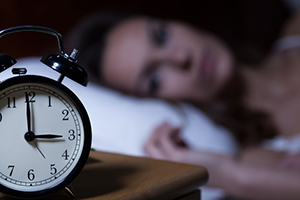 Forget about sleeping pills, teas, herbs, light devices, sound machines… and who knows what other gimmicks there are out there to sleep better.
Forget about sleeping pills, teas, herbs, light devices, sound machines… and who knows what other gimmicks there are out there to sleep better.
Your brain can cure your insomnia on its own!
All it takes a little encouragement.
Neurofeedback is a process during which you learn to control your brain activity and the frequencies of your brain waves, measured in hertz.
A therapist connects an electroencephalogram machine (or EEG) to your brain that displays your brain waves.
As you concentrate and try to change your brain waves to the desired frequencies that treat the specific condition you want treated, the machine gives you positive or negative feedback according to whether you are managing to hit that frequency or not.
When you hit the required frequency, the achievement of being able to do so intentionally serves as a great reward for your brain to try to repeat this feat in the future.
In other words, the more time you spend on the desired frequency, the more your brain is rewarded for it, and the better it will become at functioning at that frequency.
New research from the University of Salzburg in Austria, published in the journal Brain, suggests that this treatment may work for different reasons than is usually thought.
They identified the brainwave frequency of 12-15 hertz as one that many previous studies proved worked for insomniacs.
They subjected each of their 25 insomniac subjects to 12 sessions of real neurofeedback therapy and 12 sessions of placebo neurofeedback therapy.
Before, halfway, and after both the real and sham treatment sessions, the volunteers slept in the laboratory while the researchers measured their brainwaves on an EEG to see whether their sleep really improved.
They found participants reported their sleep improved after both the placebo and the real neurofeedback, suggesting that it was something other than the treatment that was responsible for the perceived improvement.
The researchers speculated that the caring and empathy from the researchers made the insomniac participants feel they were sleeping better than before.
The only problem in this case is that the researchers found no improvement in their subject’s sleep on the EEG, even though they reported feeling like they were sleeping better.
It is difficult to know what to make of this result.
The positive effects of feeling like you sleep better without biologically sleeping better will probably wear off with time, leaving you as tired as before.
As well, many experts will argue that 12 neurofeedback sessions are not enough to cultivate the new brainwaves to facilitate better sleep.

 Overcoming IBD
Overcoming IBD Multiple Sclerosis
Multiple Sclerosis Banishing Bronchitis
Banishing Bronchitis Gum Disease Gone
Gum Disease Gone Overcoming Onychomycosis
Overcoming Onychomycosis Neuropathy No More
Neuropathy No More The Prostate Protocol
The Prostate Protocol Brain Booster
Brain Booster
 Ironbound
Ironbound
 Solution for Shingles
Solution for Shingles
 The Bone Density Solution
The Bone Density Solution
 The Ultimate Healing Protocol
The Ultimate Healing Protocol
 The Parkinson's Protocol
The Parkinson's Protocol
 The Chronic Kidney Disease Solution
The Chronic Kidney Disease Solution
 Overthrowing Anxiety
Overthrowing Anxiety The Fatty Liver Solution
The Fatty Liver Solution The Hypothyroidism Solution
The Hypothyroidism Solution
 The End of Gout
The End of Gout The Blood Pressure Program
The Blood Pressure Program
 The Oxigized Cholesterol Strategy
The Oxigized Cholesterol Strategy
 Stop Snoring And Sleep Apnea Program
Stop Snoring And Sleep Apnea Program
 The Arthritis Strategy
The Arthritis Strategy The Vertigo & Dizziness Program
The Vertigo & Dizziness Program The 3-Step Diabetes Strategy
The 3-Step Diabetes Strategy Hemorrhoids Healing Protocol
Hemorrhoids Healing Protocol The Erectile Dysfunction Master
The Erectile Dysfunction Master Weight Loss Breeze
Weight Loss Breeze The IBS Program
The IBS Program The Insomnia Program
The Insomnia Program The Migraine and Headache Program
The Migraine and Headache Program The Neck Pain Solution
The Neck Pain Solution The Menopause Solution
The Menopause Solution The Ejaculation Master
The Ejaculation Master The TMJ Solution
The TMJ Solution The Acid Reflux Solution
The Acid Reflux Solution The Fibromyalgia Solution
The Fibromyalgia Solution The Psoriasis Strategy
The Psoriasis Strategy